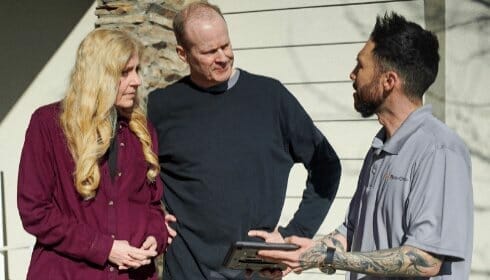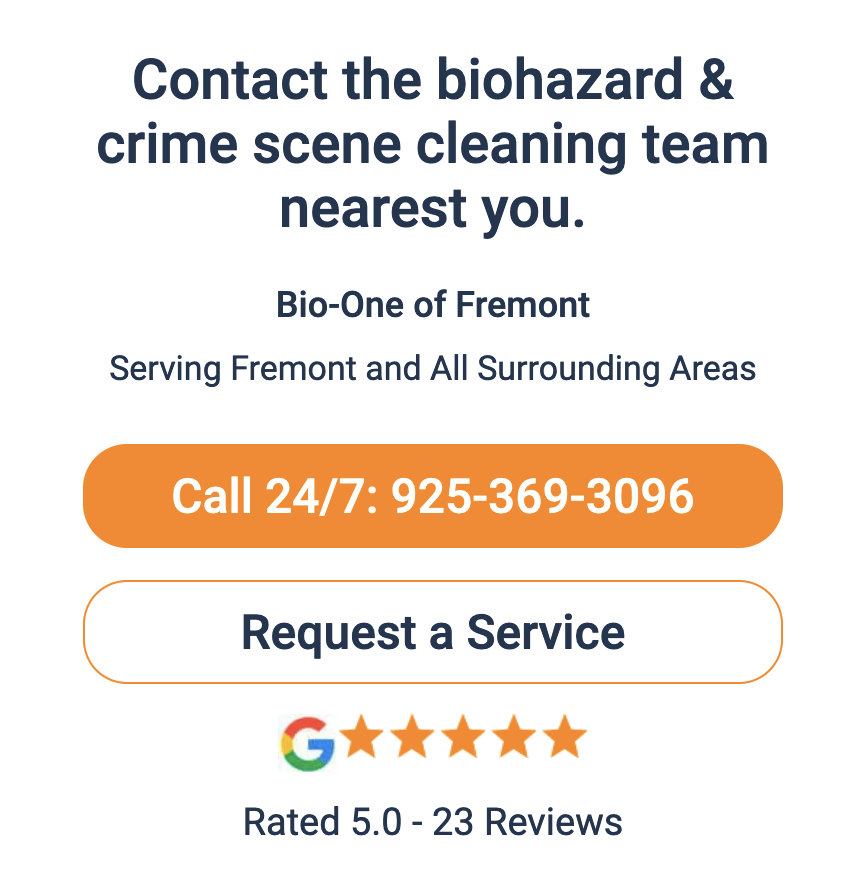The origins of crime- and trauma-scene cleaning services can be traced back to the 1990s when only a handful of companies operated in this industry. At that time, the field lacked regulation, and awareness of contamination risks was minimal.

"I was young and inexperienced and found myself in a situation straight out of a movie. I quickly took action to assist a woman in her time of dire need, and that's how I entered the crime scene and cleaning business," shared Nick-Anthony Zamucen, Founder of Bio-One Inc. Read more about Nick's journey in Franchise Times.
Today, the landscape has changed dramatically, with hundreds of companies advertising crime and trauma scene cleaning services. However, navigating through this multitude of options during one of life's most traumatic moments can be overwhelming. To help you make an informed decision, we've compiled a list of questions to ask before selecting a crime and trauma scene company.
When evaluating crime and trauma scene cleaning technicians or business owners, asking the right questions is crucial to finding the best fit for your needs and circumstances.
Above all, ensure that the company you choose demonstrates care and compassion for your situation. Their primary focus should be on providing support and assistance to you and your loved ones during this challenging time.
If you're in need of a compassionate and professional crime and trauma scene cleaner, Bio-One Fremont is here for you. All our offices operate by the motto "Help First, Business Second" and are available 24/7. Reach out to us or click here to locate a Bio-One team near you.

In the aftermath of a crime, accident, or traumatic event, the cleanup of the scene often falls to specialized professionals trained to handle biohazards and hazardous materials. However, unlike many other industries, crime scene cleanup operates within a regulatory gray area, where oversight and standards vary widely across jurisdictions. This lack of uniform regulation raises concerns regarding safety, service quality, and ethical practices within the industry.
One primary challenge stemming from this lack of regulation is the potential for inconsistencies in training and certification standards among crime scene cleanup companies. While some states may have certification programs or voluntary guidelines, there is no standardized national framework governing the qualifications and training requirements for individuals entering the field. Consequently, there may be disparities in the level of expertise and professionalism among cleanup providers, posing risks to both workers and the public.

Moreover, the absence of regulatory oversight can lead to ethical concerns regarding the exploitation of vulnerable individuals in distressing situations. Without clear guidelines, unscrupulous companies may engage in price gouging, predatory marketing tactics, or substandard practices, taking advantage of clients' emotional vulnerability during times of crisis. This underscores the urgent need for standardized regulations to protect consumers and ensure ethical conduct within the industry.
Furthermore, the lack of regulatory oversight may hinder efforts to enforce health and safety standards in crime scene cleanup operations. Biohazardous materials present significant risks of exposure to bloodborne pathogens, toxins, and infectious diseases, necessitating strict protocols for handling, disposal, and decontamination. Without regulatory mechanisms to monitor compliance with these standards, there is potential for lapses in safety practices, putting both cleanup workers and the public at risk.
In conclusion, the absence of regulation in crime scene cleanup represents a critical gap in oversight that poses risks to safety, service quality, and ethical conduct within the industry. To address these concerns, there is a pressing need for comprehensive regulatory frameworks at the state and national levels, establishing clear standards for training, certification, safety protocols, and ethical practices. By implementing robust regulatory measures, we can ensure that crime scene cleanup operations uphold the highest standards of professionalism, safety, and integrity, providing essential services to communities in times of need.
In times of family crisis, such as the loss of a loved one, unattended death, or a traumatic crime scene, the last thing you want to worry about is the cost of cleaning and restoring your property. Fortunately, many insurance policies cover these traumatic situations, providing a lifeline for those in need. Bio-One, with over 15 years of experience in trauma and crime scene cleanup, understands the challenges and complexities associated with these situations. That's why we're dedicated to working directly with your insurance provider to make the process as smooth as possible, from opening the claim to completing the project. This not only eases the financial burden but also allows you to focus on what truly matters - moving forward.
Before delving into how Bio-One collaborates with insurance companies, it's essential to comprehend the insurance aspect of trauma and crime scene cleanup. Many standard homeowners' and renters' insurance policies cover the costs associated with the restoration of properties affected by traumatic events. These policies aim to provide financial relief to those dealing with the emotional and physical aftermath of such incidents.
When a traumatic event occurs, you may be dealing with immense grief and emotional stress. During this challenging time, handling insurance claims and the logistics of cleanup can be overwhelming. This is where Bio-One's insurance coordination services come into play.
Bio-One's primary goal is to provide a safe and habitable space for you and your family as quickly as possible. When insurance companies are involved, we ensure that the cleanup and restoration process proceeds without unnecessary delays. By working directly with your insurer, we minimize any financial barriers that might impede your ability to return to normalcy.
This approach not only simplifies the insurance process but also allows you to focus on the emotional healing and recovery that come with traumatic events. Grieving, coping, and finding support are essential steps on your journey, and Bio-One aims to facilitate them by handling the logistical aspects of trauma and crime scene cleanup.
In times of family crisis, insurance coverage can be a vital lifeline, and Bio-One understands the importance of leveraging this support. Our experienced team of insurance coordinators will work tirelessly to ensure that your property is returned to a safe and habitable state. By collaborating directly with your insurance company, we aim to make the process as seamless as possible, allowing you to focus on moving forward and finding healing during challenging times. Bio-One is here to provide not only restoration but also peace of mind when you need it most.

The roots of crime- and trauma-scene cleaning companies can be traced to the 1990s, and at that time only a dozen or so companies existed. The industry was widely unregulated and awareness of contamination risks were relatively non-existant.
"I was young and dumb and saw something you only see in movies, so I quickly shut the door, took a deep breath, sat on the couch with the widow and told everyone else to get her out of here and take her to lunch, and we’ll clean this up for her," said Nick-Anthony Zamucen, Founder of Bio-One Inc. "We were just trying to help a lady in her greatest time of need, and that’s for me how I got into the crime scene and cleaning business." Read Nick's story in Franchise Times.
Today, there are hundreds of companies that advertise crime and trauma scene cleaning, and a simple Google search may prove overwhelming when you're experiencing one of the most traumatic moments in your life. To help, we've listed pre-qualifying questions to ask before choosing a crime and trauma scene company.
Questions to Ask Before Hiring a Crime and Trauma Scene Cleaner
There are a number of key questions to ask crime and trauma scene cleaning technicians or business owners to properly root out which one is best for your goals and circumstances.
Last but certainly most important, make sure the business you speak with shows care and compassion for your situation. They should want to do everything possible to support you and your loved ones.
If you are searching for a crime and trauma scene cleaner, Bio-One is here for you. All of our offices adhere to our business motto Help First, Business Second and are available 24/7. Click here to search for a Bio-One team near you.